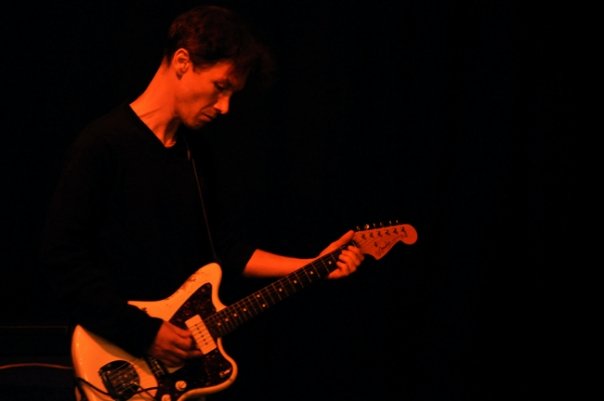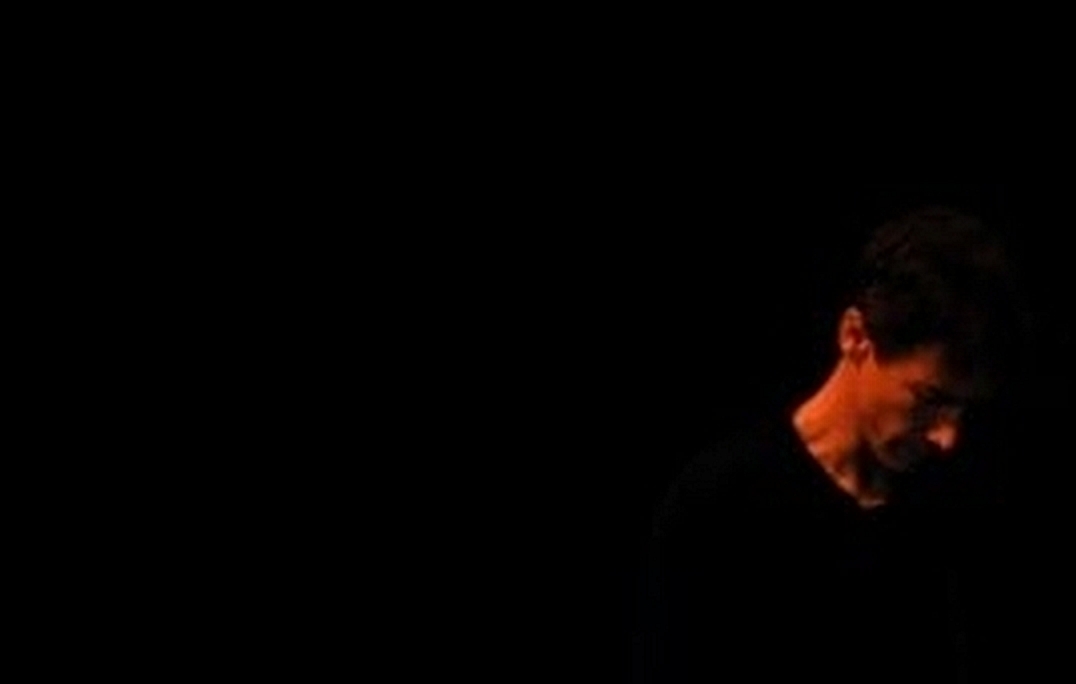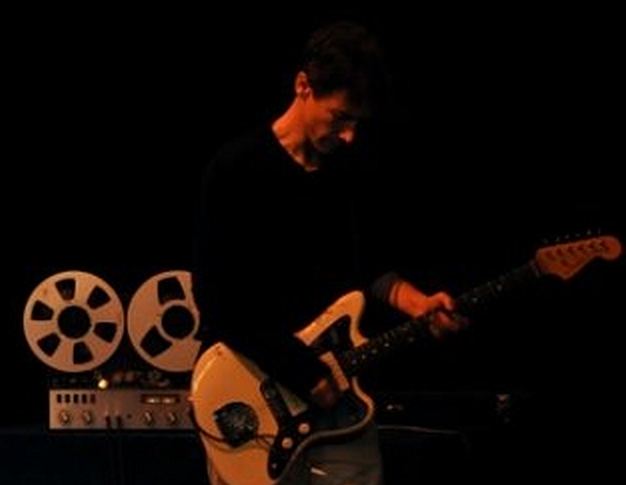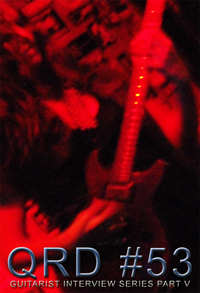
May 2011
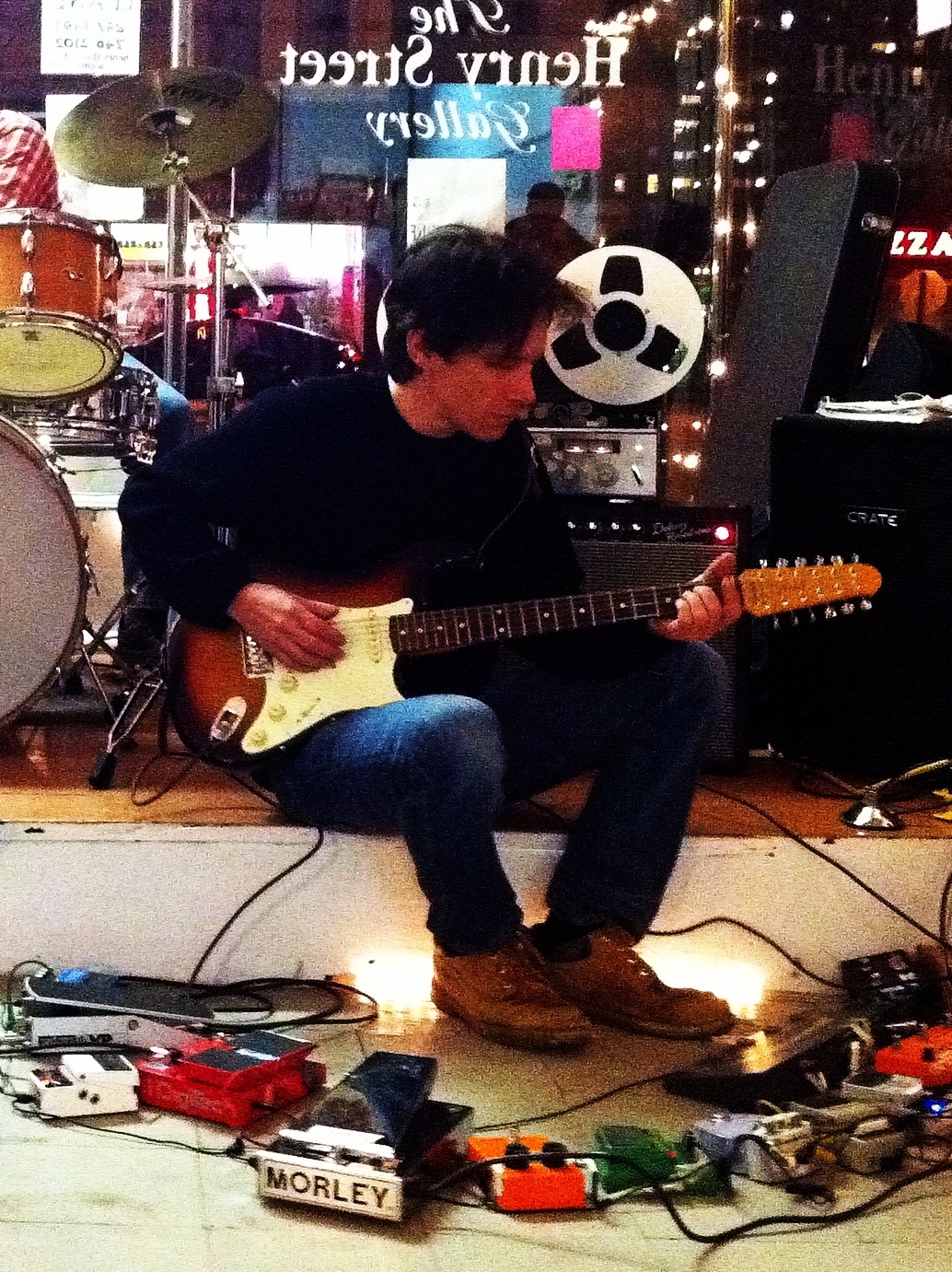
Bands: Boat Burning, Thee Dirtybeats, Triangle Rhysing
Websites: www.boatburning.com, www.theedirtybeats.com, www.trianglerhysing.com
QRD – What was your first guitar & what happened to it?
Andras – I got my first guitar, a Harmony Stella, when I was 10. It was a very cheap acoustic. Its sole asset was its red finish; in all other respects it was a profoundly bad guitar, especially for a beginner, with absurdly high action & a tone not unlike a coffee can strung with bailing wire. Would like to say that its shoddiness inspired me to work even harder to learn the guitar, but in truth I grew so frustrated that I eventually smashed the thing to pieces & swore I’d never play guitar again. Later in high school, I used the neck for a guitar-like instrument I built in my father’s workshop. I believe I smashed that one too. At one point I also had a single coil Kent electric & a little Marvel tube amp; these met similar fates. Guitars were so frustrating for me. The sounds I was getting were never like what I heard on records or the radio. I really resented that.
QRD – What’s your typical set-up from guitar to effects to amplifier?
Andras – My main guitar is an 84 Jazzmaster. I run this through a series of mostly analog pedals & split the signal three ways: (1) to a Fender Deluxe Reverb amplifier, (2) to a small bass amp, (3) to an old Revox reel to reel tape deck, which has the motors disabled so I can manipulate the reels by hand.. The effects chain I assemble new every time I play ? I don’t use an effects board ? as I like the unpredictability. That said, I usually have some combination of compressor, distortion, phase shifter, echo, looper, & volume pedal. I also use one of those big chrome Morley Wahs & a vintage Telray rotating-can tremolo.
QRD – What’s the most important part of your rig – guitar, amplifier, or effects?
Andras – The guitar, definitely.
QRD – What’s your main amplifier & why?
Andras – Fender Deluxe Reverb. Small, incredibly versatile, & puts out a lot of sound for its size & wattage. And it’s a lot easier to lug around than a Marshall stack.
QRD – What’s your main guitar & what are the features that make it such?
Andras – A 1984 Fender Jazzmaster. It has some odd features I use a lot, like the separate lead & rhythm circuits with independent volume & tone controls, & especially the generous third bridge. The tone is radically different from other guitars, probably due to the harmonics produced by the third bridge. I fool with that third bridge a lot.
QRD – If you had a signature guitar, what would it look like & what would some of its features be?
Andras – Jazzmaster-ish in every respect, except with two output jacks (the extra for just the lower two strings) & with a Fender Mustang bridge. Also, a maple neck with micro-tuners. And a whammy bar system actually that leaves the guitar in tune.
QRD – If you had a signature pedal, what would it be & what would some of its features be?
Andras – It would be some kind of looper specifically optimized for the live recording & playback of loops during a performance. Should be controllable using footswitches only. Essential: Would include a simple foot-operated mechanism for dynamically adjusting the length of a loop while it’s playing, to help synching with a live drummer. Would also include a pulse output for each loop iteration for triggering external devices.
QRD – How many guitars do you own?
Andras – Seven: an 84 Fender Jazzmaster, a 72 Fender Custom, a 65 Kapa Minstrel, a Fender Strat 12 string, an Ovation acoustic, an old Epiphone acoustic, & a Galveston chrome resonator.
QRD – How & where do you store your guitars?
Andras – Conveniently. I want them handy.
QRD – What do you wish guitar cases had that they usually don’t?
Andras – Compartment covers that don’t accidentally open.
QRD – What features do you look for when buying a guitar?
Andras – Good action, looks, & the ability to stay in tune.
QRD – How much do you think a good guitar should cost?
Andras – Guitars are such a commodity nowadays. $200-300 buys an astonishingly good-playing low-end Strat, & that’s one made by Fender. At prices like that, it’s hard to justify paying more, unless you are after a particular sound that can only be had by a certain classic guitar.
QRD – Do you upgrade & customize your guitars or just stick with what you get?
Andras – I’m less concerned with modifying the sound of an instrument than in optimizing it for long bouts of really hard playing. So, bridges & tuners I fool with, because that affects staying in tune, but pickups I always leave stock.
I play really hard, so I’ve had a lot of problems with my strings jumping out of the Jazzmaster’s stock saddle bridge. Swapping that out for a Fender Mustang bridge helps a lot.
72 Fender Telecaster Customs, with their infamous 3 bolt necks & 3-saddle bridges, are notorious for intonation & tuning problems. Mine was unplayable until I gave Wes Lambe, a luthier in Carrboro, free reign. He countersunk brass insets to receive the 3 neck bolts, replaced the bridge with 6 independently adjustable saddles, & replaced the stock tuners with micro-tuners. It’s now the guitar I reach for when I need something that’s in tune..
QRD – Do you change your rig around often?
Andras – Constantly. I actually *like* the disruption that occurs when I change things. Keeps things fresh.
QRD – Are you after one particular guitar tone & locking into it, or do you like to change your tone around a lot?
Andras – I change my tone constantly, as I am usually doing several things at once that work best where there are a lot of contrasting textures & tones ? e.g. live playing + loops + mangling my sound with pedals + mangling my sound with an open reel tape deck.
QRD – What are some guitars, amps, & pedals you particularly lust after?
Andras – Back in the late 70s when I was a starving student in Boston, I fell hard for this beat-up baby blue Fender Mustang. I’d visit it 2-3 times a week at Mr. Music on Harvard Street & play it for hours. But I was so poor I never had enough money to buy it & it was only $150! Still dream about that guitar.
QRD – What do you think are some important features to be on a person’s first guitar that aren’t always there?
Andras – Action, action, action. And the thing must be able to stay in tune. And ? this is most important ? one’s first guitar must be inexpensive. You have to feel totally uninhibited to approach your guitar, to use/abuse it, to bend it to your will. Can’t do that if your guitar costs a fortune.
QRD – What have been the best & worst guitar related purchases you’ve made?
Andras – Best: 72 Fender Telecaster Custom $150
Worst: Galveston resonator
QRD – How old were you when you started playing guitar?
Andras – I was 10. My younger brother & I played in a band we called “The Wiretappers”, which at the time we thought was about the coolest name ever. We had one gig; it was a birthday party. Since we only knew one song, “Nothing Can Change The Shape Of Things To Come” (by Max Frost & the Troopers), we just played that over & over. It was glorious.
QRD – At what age do you think you leveled up to your best guitar playing?
Andras – I was 21, living in Boston, when I acquired my first real guitar, the ‘72 Telecaster Custom. It was a fluke really; my neighbor owed me $150, & insisted on giving me the guitar instead. I had no money for an amp, so I fashioned one from an Executone tube PA got for $10 at a yard sale. Then I got this inexpensive programmable drum machine kit by mail order, a PAiA 3750, for like $20. I plugged all this stuff together in my basement & played that rig for hours & hours, almost every night for about two years straight, the PAiA in one input jack & my guitar in the other, with the volume at 11. Over time, I found I was able to control the screech & howl of the Tele through the Executone & bend it to the relentless rhythm of the PAiA. Playing along with drum machine at high volume was key in developing my sense of timing, as that little box was utterly unforgiving ? you either rode the rhythm really hard, or it would walk all over you. Later, I got some reel-to-reel tape decks & began experimenting with mechanically manipulating the sounds I was making in real time & feeding that back into the mix. I still have a few recordings of those early experiments. Really raw stuff, but definitely had energy.
QRD – Why do you think a guitar fits you more so than other instruments?
Andras – The dual nature of the guitar is really appealing to me. With a guitar, one can create intricate delicate things of great beauty & one can great monstrous things of brutality & ugliness. Weirdly, this can be accomplished in the same composition. I can’t think of another instrument that has such range.
QRD – Do you think guitar should be people’s first instrument as often as it is?
Andras – The guitar may just be the perfect first instrument. More or less portable, a guitar can withstand a lot of abuse & with very little effort & zero music theory, a beginner can be strumming simple songs in no time & you can choose to stay at that level or go really deep.
QRD – Do you see your guitar as your ally or adversary in making music?
Andras – I just don’t elevate guitars to that level. To me, a guitar is just a tool. When I’m not getting the results I want with a particular tool, I ask myself whether or not I can accept the results I am getting. If the answer is no, I find another tool.
QRD – Who are the guitarists that most influenced your playing & sound?
Andras – Robby Kreiger & Tony Iommi impressed me early on, as did Robert Fripp’s early 70s work with the Red-era King Crimson; later, I thought Roger Miller’s work with Mission of Burma was pretty interesting.
QRD – Do you think people anthropomorphizing their guitars is natural or silly (e.g. naming their guitar)?
Andras – A little silly. Isn’t that like naming one’s favorite screwdriver?
QRD – What’s the most physical damage you’ve done to a guitar & how did you do it?
Andras – In addition to smashing &/or burning my first guitars, I once had this perfectly fine SG copy with which I thought I’d try some rewiring experiments. Then I figured I’d install some different pickups. And then, a center tap switch. After that, I thought I’d cut away chunks of the body I felt were superfluous. Then I figured I’d sand the thing smooth, & paint it flat black. I played this Frankenstein for a while, but was secretly very unhappy with it. It was an important lesson about the slippery slope one can get on with guitar mods.
QRD – What do you do to practice other than simply playing?
Andras – The distinction between practice & playing is moot for me. It’s all playing, & all playing is practice for future playing.
QRD – How many hours a week do you play guitar & how many hours would you like to?
Andras – 10-16 hours a week nominally; more when a show is on the horizon.
QRD – What type of pick do you use & why?
Andras – Dunlop Tortex greens (.88mm) or similar. I need a durable pick, as I wear them out pretty fast.
QRD – What gauge strings do you use & why?
Andras – I use 0.13s, because I play rather hard. It helps, but I still occasionally break strings.
QRD – How often do you change strings?
Andras – Generally only when they break.
QRD – How often do you break strings?
Andras – Every gig, just about. I lean into my playing a bit, but it’s not just that. I tend to attack certain parts of the guitar (e.g. the bridge, the nut) where the strings are less flexible & more vulnerable to breakage.
QRD – Which do you feel is more proficient, your strumming hand or fretting hand & how does that effect your style?
Andras – Definitely my right. I played banjo for a while in my teens & that infected my right hand technique to the point that for a long time, I felt more comfortable playing without a pick than with. I still occasionally play an entire show claw hammer style, without a pick.
QRD – Do you set-up your guitar yourself or send it to a guitar tech (or not set it up at all) & why?
Andras – I always send my guitars to a tech. These are guys that set up guitars all the time & have the right equipment. Intonating a guitar isn’t rocket science, but it’s not trivial. I want it done right.
QRD – What tunings do you use & why?
Andras – Standard tuning, mostly. Sometimes I’ll use drop D. Occasionally, I’ll invite an audience member up to snip one or two middle strings with a pair of wire cutters, & play the rest of the show that way. Faced with a sudden limitation, it’s amazing what you can come up with.
QRD – Do you prefer tablature, sheet music, or some other notation system for writing down your own ideas?
Andras – I don’t write down anything; I prefer to just start playing & see what comes up.
QRD – How high do you hold your guitar when playing (strap length)?
Andras – About waist high. It’s an outmoded affectation I picked up during the heydays of punk. I really could benefit from holding my guitar higher. I’m just used to it.
QRD – Playing what other instrument do you think can most help someone’s guitar playing?
Andras – I draw a lot of right hand technique from what I learned on 5 string banjo.
QRD – What’s your favorite guitar gadget (ebow, capo, slide, string cutter, etc)?
Andras – A contact mic. Affixed to a guitar’s headstock, a contact mic yields an exotic sound very similar to a gamelan; affixed to a guitar pick, it yields this percussive, banjo-like sound.
QRD – Did you ever take guitar lessons & if so, what did you learn from them?
Andras – Django Haskins (The Old Ceremony) helped me out a great deal. He’s an astonishingly versatile player & far deeper into avant garde playing than most people suspect. I also once took a lesson from Mission of Burma’s Roger Miller, who gave me some solid advice on harmonics & the proper use of alligator clips.
QRD – What would you teach someone in a guitar lesson that you don’t think they would generally get from a guitar teacher?
Andras – Find a very simple 2-chord song that you absolutely, positively love, a private place that you can play without feeling self-conscious, & play that song, over & over, until you can belt it out convincingly. And then, play with someone. All else is noise.
QRD – What’s something someone would have to do to emulate your style?
Andras – Embrace change: in a live setting, inject some sonic damage, listen to how your band reacts, & go with it. Stay alert & be wary of getting too comfortable; keep moving. Seriously, that’s about it.
QRD – What’s your take on tremolo systems?
Andras – Tremolo systems are necessary evils. I love them & use them a lot, but I’ve yet to find one that doesn’t make a guitar go horribly out of tune.
QRD – How often do you adjust your tone knob?
Andras – Most of the time I leave the tone turned all the way down to just a quarter. I do mess with the tone a lot though, using a vintage Morley wah.
QRD – What do you see as the difference between lead guitar & rhythm guitar players?
Andras – Hard to be, let alone find, a good rhythm guitar player. Playing rhythm guitar requires Zen-like ego-less-ness, a quality not generally associated with rock & roll musicians, as it’s the very opposite of the assertiveness required to execute a convincing lead. And yet, rhythm guitar is essential. In Boat Burning, I often have to switch between playing rhythm & lead. The mental shift is quite challenging; I don’t always get it right.
QRD – If a band has good guitar work, can you ignore the rest of the band not being good?
Andras – I can’t. I don’t believe in prima donnas: a band’s success or failure is a shared responsibility.
QRD – Where can people hear your best guitar work?
Andras – Being pure improv, Boat Burning is fundamentally a live band & officially shuns recording. That said, there are plenty of unofficial recordings of our improvs on the web, some of which can be heard on the Boat Burning website www.boatburning.com. Keep in mind that everything you hear on that site was created entirely in the moment: 100% improv, no pre-recorded loops, no synths, no computers, no overdubs, no pre-conceived strategies.
I particularly like my playing on the early Boat Burning improv “This Is Not A Road”. On later Boat Burning pieces recorded prior to 2010, Pete Gamble & I switch off playing rhythm & lead. Pete’s an amazing guitarist with incredible instincts & emotion, sort of like Jeff Beck meets Sonny Sharrock. Usually I’d set up the piece with a melodic theme or throbbing rhythm & then augment/disrupt the sound with either some noisy prepared-guitar stuff &/or a droney jarring tape manipulation of our live sound, while Pete concentrated on delivering the searing, lyrical, heavily-processed leads that somehow maintained the continuity. It’s a completely different sound & way of creating than “This Is Not A Road” & I find the results equally intriguing. Because of this, on later Boat Burning recordings & shows, I switch between the two styles, either playing as the sole guitarist or with a guest guitarist.
I also play in the retro garage/psych band THEE DIRTYBEATS, sharing rhythm & lead with Jamie McLendon. Jamie’s love of maximally fuzzed-out vintage 60s guitar is infectious. I think both guitarists, Jamie & Pete, have been terrific foils for me, as have cellists Josh Starmer & Deborah Aronin, percussionists Ken Friedman & Ian Kleinfeld, & the many guest musicians who’ve collaborated with Boat Burning over the years . There is such a back & forth: I continually learn new things from playing with them, & feel very lucky & enriched from having played with them.
Other QRD interviews with Andras Fekete:
Guitarist interview update with Andras Fekete of Boat Burning & Triangle Rhysing (January 2013)







